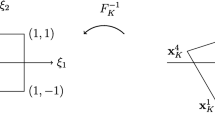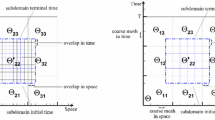Abstract
The aim of this work is to study a Schwarz domain decomposition numerical method for a stationary Rayleigh–Bénard convection problem. The model equations are the stationary version of the incompressible Navier–Stokes equations coupled with a heat equation under Boussinesq approximation. The problem is defined in a rectangular domain. The nonlinear stationary problem is dealt with a Newton method. Each step in the Newton method is solved with a Schwarz domain decomposition method with the domain partitioned into several subdomains with appropriate interface conditions. Their convergence properties are studied theoretically in a simplified domain divided in two subdomains including two artificial parameters in the equations. The numerical resolution of the problem confirms the theoretical results. The convergence rate is less than one when overlap is considered. Convergence is achieved for large values of the aspect ratio, which are inabordable for the standard Legendre collocation method. Convergence is optimal for some values of the parameters. Other advantages of this methodology compared with standard methods are parallelization and high order.







Similar content being viewed by others
References
Bénard, H.: Les tourbillons cellulaires dans une nappe liquide. Rev. Gen. Sci. Pures Appl. 11, 1261–1271 (1900)
Bernardi, C., Maday, Y.: Approximations spectrales des problèmes aux limites elliptiques. Springer, Berlin (1992)
Blayo, E., Cherel, D., Rousseau, A.: Towards optimized Schwarz methods for the Navier–Stokes equations. J. Sci. Comput. 66, 275–295 (2016)
Boffetta, G., Ecke, R.: Two-dimensional turbulence. Ann. Rev. Fluid Mech. 44, 427–451 (2012)
Brakkee, E., Vuik, C., Wesseling, P.: Domain decomposition for the incompressible Navier–Stokes equations: solving subdomains accurately and inaccurately. Int. J. Num. Meth. Fluids 26, 1217–1237 (1998)
Canuto, C., Hussaini, M., Quarteroni, A., Zang, T.: Spectral Methods in Fluid Dynamics. Springer, Berlin (1988)
Castaño, D., Navarro, M.C., Herrero, H.: Thermoconvective vortices in a cylindrical annulus with varying inner radius. Chaos 24, 043116 (2014)
Davies, G.F.: Dynamic Earth. Plates, Plumes and Mantle Convection. Cambridge University Press, Cambridge (1999)
Drazin, P.G.: Introduction to Hydrodynamic Stability. Cambridge University Press, Cambridge (2002)
Elman, H.C., Mihajlović, M.D., Silvester, D.J.: Fast iterative solvers for buoyancy driven flow problems. J. Comput. Phys. 230(10), 3900–3914 (2011)
Ghias, S.R., Jarvis, G.T.: Mantle convetion models with temperature and depth-dependent thermal expansivity. J. Geophys. Res. Solid Earth 113, B08408 (2008). https://doi.org/10.1029/2007JB005355
Gunzburger, M., Lee, H.: An optimization-based domain decomposition method for the Navier–Stokes equations. SIAM J. Math. Anal. 37, 1455–1480 (2000)
Herrero, H., Mancho, A.M.: Influence of aspect ratio in convection due to nonuniform heating. Phys. Rev. E 57, 7336–7339 (1998)
Herrero, H., Mancho, A.M.: On presssure boundary conditions for thermoconvective problems. Int. J. Numer. Meth. Fluids 39, 391–402 (2002)
Herrero, H., Hoyas, S., Donoso, A., Mancho, A.M., Chacón, J.M., Portugués, R.F., Yeste, B.: Chebyshev collocation for a convective problem in primitive variable formulation. J. Sci. Comput. 8, 312–328 (2003)
Holmedal, B.: Stability of squares and rolls in Rayleigh–Bénard convection in an infinite-Prantl-number fluid between slabs. J. Fluid Mech 537, 271–284 (2005)
Juel, A., Mullin, T., Ben Hadid, H., Henry, D.: Three-dimensional free convection in molten gallium. J. Fluid Mech. 436, 267–281 (2001)
Kong, F., Ma, Y., Lu, J.: An optimized-based domain decomposition method for numerical simulation of the incompressible Navier–Stokes flows. Num. Meth. PDEs 27, 255–276 (2011)
Kumar, P.: Purely algebraic domain decomposition methods for the incompressible Navier–Stokes equations. ArXiv e-prints (2011)
Mathew, T.P.A.: Domain Decomposition Methods for the Numerical Solution of Partial Differential Equations. Springer, Berlin (2008)
Moresi, L.N., Solomatov, V.S.: Numerical investigation of 2D convection with extremely large viscosity variations. Phys. Fluids 7(9), 2154–2162 (1995)
Muller, L., Lube, G.: A nonoverlap domain decomposition method for the nonstationary Navier–Stokes problem. ZAMM J. Appl. Math. 81, 725–726 (2001)
Pla, F., Mancho, A.M., Herrero, H.: Bifurcation phenomena in a convection problem with temperature dependent viscosity at low aspect ratio. Physica D 238, 572–280 (2009)
Qin, L., Xu, X.: On a parallel robin-type nonoverlap domain decomposition method. SIAM J. Numer. Anal. 44, 2539–3558 (2006)
Quarteroni, A., Valli, A.: Domain Decomposition Methods for Partial Differential Equations. Oxford Science Publications, Oxford (1999)
Ronquist, E.: A domain decomposition solver for the steady Navier–Stokes equations. In: Llin, A., Scott, L. (eds.) Proceedings ICOSAHOM-95, pp. 469–485 (1996)
Smith, B., Bjorstad, P., Gropp, W.: Domain Decomposition: Parallel Multilevel Methods for Elliptic Partial Differential Equations. Cambridge University Press, Cambridge (1996)
Strikwerda, J., Scarbnick, C.: A domain decomposition method for incompressible flow. SIAM J. Sci. Comput. 14, 49–67 (1993)
Toselli, A., Widlund, O.: Domain Decomposition Methods-Algorithms and Theory. Springer, Berlin (2010)
Wildlund, O.B., Keyes, D.E. (eds.): Domain Decomposition Methods in Science and Engineering XVI. Springer, Berlin (2007)
Xu, X., Chow, C., Lui, S.H.: On non overlap domain decomposition methods for the incompressible Navier–Stokes equations. ESAIM Math. Mod. Num. Anal. 39, 1251–1269 (2005)
Acknowledgements
This work was partially supported by Research Grants MTM2015-68818-R (MINECO, Spanish Government) and PEII-2014-006-A (Junta de Comunidades de Castilla-La Mancha), which include RDEF funds.
Author information
Authors and Affiliations
Corresponding author
Rights and permissions
About this article
Cite this article
Herrero, H., Pla, F. & Ruiz-Ferrández, M. A Schwarz Method for a Rayleigh–Bénard Problem. J Sci Comput 78, 376–392 (2019). https://doi.org/10.1007/s10915-018-0771-1
Received:
Revised:
Accepted:
Published:
Issue Date:
DOI: https://doi.org/10.1007/s10915-018-0771-1




